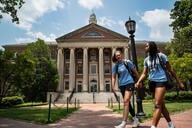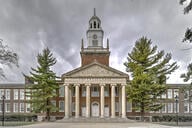You have /5 articles left.
Sign up for a free account or log in.
Hundreds of colleges have begun seeking a new accreditor after the U.S. Department of Education last month backed a federal panel’s decision to terminate the Accrediting Council for Independent Colleges and Schools.
The council is the largest national accrediting agency. Last year it was the gatekeeper for $4.76 billion in federal financial aid, most of it going to the for-profit institutions that make up the bulk of its members. ACICS oversees 245 institutions and 674 campus locations, which enroll roughly 600,000 students (361,054 degree-seeking undergraduates, according to federal data).
While ACICS has appealed the feds’ decision, the agency is on life support. As a result, up to 300 of the locations it oversees have inquired about being approved by the Accrediting Commission of Career Schools and Colleges, officials with ACCSC said last week.
The commission faces the difficult task of reviewing a flood of applications from colleges in a controversial sector, which are looking to jump from a tarnished accreditor that oversaw the collapsed Corinthian Colleges and ITT Technical Institutes.
“We want to ensure that our agency continues to do the high-level work we’re known for,” said Michale McComis, ACCSC’s executive director.
The agency recently added a step to its process, and now requires candidate institutions to pre-apply. Those that get a green light will be invited to formally seek approval.
McComis said ACCSC also will be asking more questions about potential problems colleges are facing, including investigations by state and federal authorities. And he said the agency has placed a “finer point” on institutional finances.
The clock will be ticking, after the department finalizes its decision and ACICS’s appeal is resolved, as its member colleges will have a federally mandated grace period of 18 months to find a new accreditor and preserve their access to federal financial aid. A possible lawsuit could lengthen that timeline, however.
Meanwhile, ACICS isn’t the only accreditor under fire. The Obama administration, consumer groups, Democrats in the U.S. Senate and some of their Republican colleagues all have criticized accreditors for failing to hold poorly performing colleges accountable, including in areas of consumer protection that traditionally have been the job of state regulators.
As a result, ACCSC faces the challenge of being both expedient and thorough, while critics watch closely.
The commission and others receiving applications from ACICS colleges should be able to manage, said Judith Eaton, president of the Council for Higher Education Accreditation, which represents colleges on accreditation issues.
“Accreditors are going to need to stick to their standards and processes,” she said. “Scrutiny is heightened. That pressure is even more in the for-profit sector.”
Ben Miller is senior director for postsecondary education at the Center for American Progress and an influential critic of ACICS. He said public attention to accreditors’ review of colleges that seek a new agency will serve as a good counterbalance to the temptation to rush through the applications.
“Many ACICS schools should and hopefully can find a new accreditor,” Miller said. But if “every ACICS school finds a new home, that might raise some questions about how fast the process went.”
Doubling Down
ACCSC is the second-largest national accreditor, having overseen the disbursement of $3 billion in federal aid last year to colleges that collectively enroll 232,416 degree-seeking students. Like ACICS, most of the colleges it oversees -- 343 of 390 institutions -- are for-profit, according to accreditor “dashboards” the department recently rolled out.
However, the commission in August got positive marks from the federal panel that oversees accreditors, which recommended renewing ACCSC’s recognition for the maximum allowed time frame of five years.
Miller also praised ACCSC, saying it “runs a tighter ship” than ACICS and that he’s somewhat optimistic the accreditor will do a good job of reviewing all the new applicants. He said it helps that several of the most troubled and controversial ACICS-approved colleges have closed.
ACCSC is the best fit for most ACICS colleges, experts said. Like ACICS, the national accreditor focuses on career and technical education. And its scope ranges from non-degree-granting institutions to those that issue certificates and associate, bachelor’s and master’s degrees.
“We probably have the scope that is most similar to ACICS’s,” said McComis.
The Council on Occupational Education appears to be the most popular alternative. Gary Puckett, the national accreditor’s executive director and president, said COE so far has received 30 inquiries. The Distance Education Accrediting Commission has received four, said Leah Mathews, that organization’s executive director and CEO.
A handful of ACICS colleges also may attempt to gain approval from regional accreditors, said observers. Yet with nearly 300 inquiries in so far, ACCSC is the most popular option by far. (That number is more than ACICS’s total number of accredited colleges because ACCSC requires branch campuses, not just primary institutions, to go through its oversight process.)
An avalanche of applications will pose a workload challenge for the accreditor, its 30 or so employees and the much larger group of volunteers who review member colleges and new applicants. In a normal year, McComis said, ACCSC will review between 140 and 170 colleges that are seeking renewal of their accreditation status or to apply for the first time.
“We’re going to take one of those years and almost double it,” he said.
As a result, McComis said the agency has requested more time from its employees and volunteers.
“We’re really just asking everybody, even our board members, if they can do more,” he said.
Roughly 125 ACICS colleges are slated to begin the application process, said McComis, and have signed up for an initial accreditation workshop in December.
Paul Gaston, a Trustees Professor at Kent State University and an expert on accreditation, has been working on comparisons between national accreditors. He said the eight-stage candidacy process ACCSC requires is “considerably more demanding than the three-stage ACICS process.”
Accreditors often are sued by colleges they punish. In rare cases judges block their actions, citing the damage those penalties pose to a college -- even when the judge acknowledges serious problems at the institution.
However, Gaston said ACCSC prevailed in one such case, when a federal judge had blocked the agency’s attempt to withdraw accreditation from a troubled massage school in Missouri, calling ACCSC’s actions “arbitrary and unreasonable” and taking the unusual step of fining the agency $420,000. But ACCSC won an appeal, in a decision experts hailed as an important one to reinforce the courts’ deference to accreditors.
The court fight is another sign of ACCSC’s competence, which Gaston said raises an interesting question about the possibility of many of ACICS’s institutions moving over.
“If the transition can be managed easily, why were there two associations in the first place?” he said.
Uncertainty in the States
At least one ACICS member institution has cited uncertainty about finding a new accreditor as a reason for shutting down.
Brooks Institute, a for-profit visual arts college based in California, in August announced it would shut down this month. Officials there felt the loss of recognition for its accreditor and the looming impact of federal gainful employment regulations were “significant factors” in the decision, said Aaron Lacey, a lawyer in St. Louis who has worked with the institute.
Brooks previously had faced scrutiny, and in 2012 admitted to overstating its job placement rate -- a revelation ACICS helped unearth. But the institute appeared to be in good standing with its accreditor and the feds after being sold last summer by Career Education Corporation, a large for-profit chain, to GPHomestay, a company that works with international students.
However, the institute had struggled with declining enrollment and revenue, Lacey said, and its leaders were concerned about whether another accreditor would be hesitant to take on Brooks amid the department’s new push for accreditors to scrutinize colleges’ financial stability.
Lacey also said Brooks was dubious that state regulators in California would allow the college to operate during the full 18-month grace period the feds have promised to grant ACICS institutions. That’s because states require federal-aid-eligible colleges to be accredited by agencies the department recognizes. And regulators in some states remain uncertain about the grace period, Lacey said.
For example, the Minnesota Office of Higher Education last month distributed an email saying it received “some indication” that the department would extend provisional aid eligibility to colleges during the grace period, but that “our office is still waiting for confirmation on this language,” according to the email.
Because of that uncertainty in Minnesota and other states, Lacey said several of his client colleges are “deeply concerned they might somehow lose the ability to operate.”




